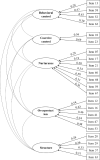Psychometric properties of the item-reduced version of the comprehensive general parenting questionnaire for caregivers of preschoolers in a Finnish context
- PMID: 35925931
- PMCID: PMC9352000
- DOI: 10.1371/journal.pone.0270869
Psychometric properties of the item-reduced version of the comprehensive general parenting questionnaire for caregivers of preschoolers in a Finnish context
Abstract
Introduction: Many instruments for assessing general parenting have been reported as burdensome and are thus seldom used in studies exploring children's energy balance-related behaviors or weight. This study evaluates the factorial structure of the item-reduced version of the Comprehensive General Parenting Questionnaire (CGPQ), which assesses five constructs of general parenting.
Methods: The study uses data from two cross-sectional studies: Study 1 in 2014 (n = 173) and Study 2 in 2015-16 (n = 805). Parents of children aged three to six answered the CGPQ; in Study 1 the 69-item version, and in Study 2 the 29-item version. The reduction was based on the results of the confirmatory factor analyses (CFA) in Study 1. In both datasets, internal consistency, as Cronbach's alphas and intraclass correlations between the items of each construct, was tested. A combined assessment of the CFA and items response theory evaluated the construct validity and the item importance for the 29-item version, and a further the reduced 22-item version.
Results: In Study 1, the highest Cronbach's alphas were shown for the five constructs in the 69-item version. A higher intraclass correlation was found between the constructs in the 69- and 29-item versions, than between the 69- and the 22-item version. However, a high concordance was found between the constructs in the 29- and 22-item versions in both Study 1 and in Study 2 (0.76-1.00). Testing the goodness-of-fit of the CFA models revealed that the 22-item model fulfilled all the criteria, showing that it had a better factorial structure than the 29-item model. Standard estimations ranged from 0.20 to 0.76 in the 22-item version.
Conclusion: The reduced 22- and 29-item versions of the 69-item CGPQ showed good model fit, the 22-item version the better of the two. These short versions can be used to assess general parenting without overburdening the respondents.
Conflict of interest statement
The authors have declared that no competing interests exist.
Figures
Similar articles
-
Development of the Comprehensive General Parenting Questionnaire for caregivers of 5-13 year olds.Int J Behav Nutr Phys Act. 2014 Feb 10;11:15. doi: 10.1186/1479-5868-11-15. Int J Behav Nutr Phys Act. 2014. PMID: 24512450 Free PMC article.
-
The physical activity parenting practices (PAPP) item Bank: a psychometrically validated tool for improving the measurement of physical activity parenting practices of parents of 5-12-year-old children.Int J Behav Nutr Phys Act. 2020 Nov 4;17(1):134. doi: 10.1186/s12966-020-01036-0. Int J Behav Nutr Phys Act. 2020. PMID: 33148276 Free PMC article.
-
The Chinese version of the Perceived Stress Questionnaire: development and validation amongst medical students and workers.Health Qual Life Outcomes. 2020 Mar 13;18(1):70. doi: 10.1186/s12955-020-01307-1. Health Qual Life Outcomes. 2020. PMID: 32169070 Free PMC article.
-
Calibration of the food parenting practice (FPP) item bank: tools for improving the measurement of food parenting practices of parents of 5-12-year-old children.Int J Behav Nutr Phys Act. 2020 Nov 16;17(1):140. doi: 10.1186/s12966-020-01049-9. Int J Behav Nutr Phys Act. 2020. PMID: 33198790 Free PMC article.
-
Parental Stress Assessment with the Parenting Stress Index (PSI): A Systematic Review of Its Psychometric Properties.Children (Basel). 2022 Oct 28;9(11):1649. doi: 10.3390/children9111649. Children (Basel). 2022. PMID: 36360377 Free PMC article. Review.
References
-
- Van De Kolk I, Verjans-Janssen SRB, Gubbels JS, Kremers SPJ, Gerards SMPL. Systematic review of interventions in the childcare setting with direct parental involvement: Effectiveness on child weight status and energy balance-related behaviours. Int J Behav Nutr Phys Act. 2019;16(1):1–28. - PMC - PubMed
Publication types
MeSH terms
LinkOut - more resources
Full Text Sources
Medical


